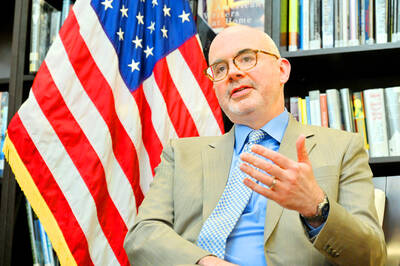In a speech on Saturday, Russian President Vladimir Putin blamed US policy for inciting other countries to seek nuclear weapons to defend themselves from an "almost uncontained use of military force" -- a stinging attack that underscored growing tensions between Washington and Moscow.
"Unilateral, illegitimate actions have not solved a single problem, they have become a hotbed of further conflicts," Putin said at a security forum attracting senior officials from around the world. "One state, the United States, has overstepped its national borders in every way."
In what his spokesman acknowledged was Putin's harshest criticism of the US, the Russian leader attacked US President George W. Bush's administration for stoking a new arms race by planning to deploy a missile defense system in eastern Europe and for backing a UN plan that would grant virtual independence to Serbia's breakaway province of Kosovo.
The Bush administration said it was surprised and disappointed by Putin's remarks.
"His accusations are wrong," said Gordon Johndroe, Bush's national security spokesman.
"We are surprised and disappointed with President Putin's comments," Johndroe added. "We expect to continue cooperation with Russia in areas important to the international community such as counterterrorism and reducing the spread and threat of weapons of mass destruction."
US presidential hopeful Senator John McCain, who was also attending the conference, described Putin's remarks as "the most aggressive speech from a Russian leader since the end of the Cold War."
The US and an increasingly assertive Russia have repeatedly butted heads during the past year, with US Vice President Dick Cheney accusing Moscow of using its energy resources as "tools of intimidation or blackmail."
Washington has also been angered by Russia's reluctance to impose meaningful sanctions against Iran, which is accused of seeking to develop nuclear weapons under the cover of a civilian atomic energy program.
But Putin said it was "the almost uncontained hyper use of force in international relations" that was forcing countries opposed to Washington to seek to build up nuclear arsenals.
"It is a world of one master, one sovereign ... it has nothing to do with democracy," he said. "This is nourishing the wish of countries to get nuclear weapons."
"This is very dangerous, nobody feels secure anymore because nobody can hide behind international law," Putin told the gathering.
Putin did not mention the wars in Iraq or Afghanistan. But he voiced concern about NATO's expansion plans as possible challenges to Russia.
"The process of NATO expansion has nothing to do with modernization of the alliance or with ensuring security in Europe," Putin said.
"On the contrary, it is a serious factor provoking reduction of mutual trust," he said.
On the missile defense system, Putin said: "I don't want to accuse anyone of being aggressive" but suggested it would seriously change the balance of power and could provoke an unspecified "asymmetric" response.
also see story:
Albanians protest UN Kosovo plan

SEPARATE: The MAC rebutted Beijing’s claim that Taiwan is China’s province, asserting that UN Resolution 2758 neither mentions Taiwan nor grants the PRC authority over it The “status quo” of democratic Taiwan and autocratic China not belonging to each other has long been recognized by the international community, the Mainland Affairs Council (MAC) said yesterday in its rebuttal of Beijing’s claim that Taiwan can only be represented in the UN as “Taiwan, Province of China.” Chinese Minister of Foreign Affairs Wang Yi (王毅) yesterday at a news conference of the third session at the 14th National People’s Congress said that Taiwan can only be referred to as “Taiwan, Province of China” at the UN. Taiwan is an inseparable part of Chinese territory, which is not only history but

CROSSED A LINE: While entertainers working in China have made pro-China statements before, this time it seriously affected the nation’s security and interests, a source said The Mainland Affairs Council (MAC) late on Saturday night condemned the comments of Taiwanese entertainers who reposted Chinese statements denigrating Taiwan’s sovereignty. The nation’s cross-strait affairs authority issued the statement after several Taiwanese entertainers, including Patty Hou (侯佩岑), Ouyang Nana (歐陽娜娜) and Michelle Chen (陳妍希), on Friday and Saturday shared on their respective Sina Weibo (微博) accounts a post by state broadcaster China Central Television. The post showed an image of a map of Taiwan along with the five stars of the Chinese flag, and the message: “Taiwan is never a country. It never was and never will be.” The post followed remarks

INVESTMENT WATCH: The US activity would not affect the firm’s investment in Taiwan, where 11 production lines would likely be completed this year, C.C. Wei said Investments by Taiwan Semiconductor Manufacturing Co (TSMC, 台積電) in the US should not be a cause for concern, but rather seen as the moment that the company and Taiwan stepped into the global spotlight, President William Lai (賴清德) told a news conference at the Presidential Office in Taipei yesterday alongside TSMC chairman and chief executive officer C.C. Wei (魏哲家). Wei and US President Donald Trump in Washington on Monday announced plans to invest US$100 billion in the US to build three advanced foundries, two packaging plants, and a research and development center, after Trump threatened to slap tariffs on chips made

CONSISTENT COMMITMENT: The American Institute in Taiwan director said that the US would expand investment and trade relationships to make both nations more prosperous The US would not abandon its commitment to Taiwan, and would make Taiwan safer, stronger and more prosperous, American Institute in Taiwan Director Raymond Greene said. “The US’ commitment to Taiwan has been consistent over many administrations and over many years, and we will not abandon our commitment to Taiwan, including our opposition to any attempt to use force or coercion to change Taiwan’s status,” he said in an exclusive interview with the Liberty Times (the sister newspaper of the Taipei Times) on Friday last week, which was published in the Chinese-language newspaper yesterday. The US would double down on its efforts